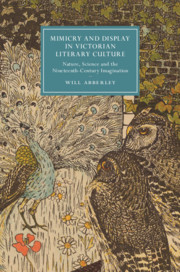 Mimicry and Display in Victorian Literary Culture
Mimicry and Display in Victorian Literary Culture Book contents
- Mimicry and Display in Victorian Literary Culture
- Cambridge Studies in Nineteenth-Century
- Mimicry and Display in Victorian Literary Culture
- Copyright page
- Contents
- Figures
- Acknowledgements
- Introduction
- Chapter 1 Seeing Things
- Chapter 2 Divine Displays
- Chapter 3 Criminal Chameleons
- Chapter 4 Darwin’s Little Ironies
- Chapter 5 Blending in and Standing out, I
- Chapter 6 Blending in and Standing out, II
- Conclusion
- Notes
- Bibliography
- Index
- Cambridge Studies in Nineteenth-Century Literature and Culture
Chapter 2 - Divine Displays
Charles Kingsley, Hermeneutic Natural Theology and the Problem of Adaptive Appearance
Published online by Cambridge University Press: 16 May 2020
- Mimicry and Display in Victorian Literary Culture
- Cambridge Studies in Nineteenth-Century
- Mimicry and Display in Victorian Literary Culture
- Copyright page
- Contents
- Figures
- Acknowledgements
- Introduction
- Chapter 1 Seeing Things
- Chapter 2 Divine Displays
- Chapter 3 Criminal Chameleons
- Chapter 4 Darwin’s Little Ironies
- Chapter 5 Blending in and Standing out, I
- Chapter 6 Blending in and Standing out, II
- Conclusion
- Notes
- Bibliography
- Index
- Cambridge Studies in Nineteenth-Century Literature and Culture
Summary
Chapter 2 examines how adaptive appearance could problematise Victorian natural theology through the example of the parson-naturalist Charles Kingsley. Kingsley’s faith was bound up with ideals of truth and sincerity, which he imagined as divine values that God’s creation exemplified and symbolised. Adaptive appearance challenged this textual view of nature, suggesting that nature’s aspects served purely to promote organisms’ survival, often through deceit. It is argued that Kingsley sometimes tried to resolve this contradiction by locating truthfulness in the rise of science instead of in raw, animal nature. In texts such as Glaucus: Wonders of the Shore and his evolutionary fairy tale The Water-Babies, he depicts science as a providential realisation of God’s values. However, Kingsley also sought to preserve vestiges of moral symbolism in nature since this notion underlay both his religious faith and the Church’s authority in knowledge of the natural world. Kingsley’s insistence on nature’s symbolism cohered with his insistence on the spirituality of the body, preserving a link between matter and divinity. This rhetorical strategy would be echoed by other religiously committed commentators who sought to reconcile adaptive appearance with the notion of nature as a divine text.
- Type
- Chapter
- Information
- Mimicry and Display in Victorian Literary CultureNature, Science and the Nineteenth-Century Imagination, pp. 65 - 85Publisher: Cambridge University PressPrint publication year: 2020


